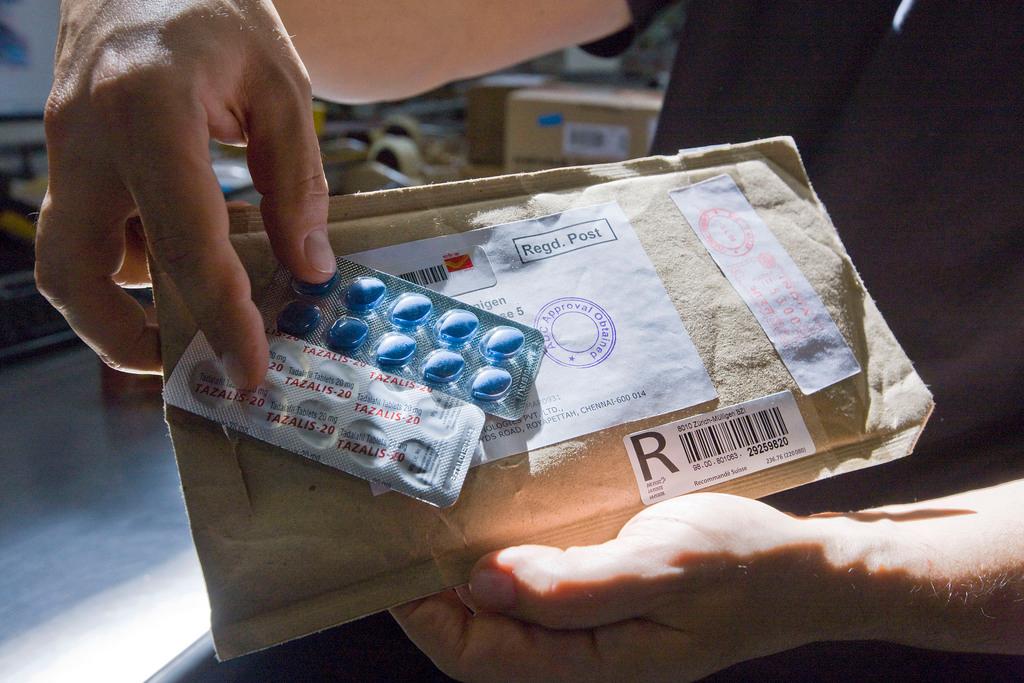
Indian versions of Viagra flood Swiss market

Swiss men are making use of a legal loophole to buy cheap generic Viagra from India on the internet. But these cut-price pills come with a health risk and are likely to be associated with pharmaceutical crime.
“Thank you for contacting us. An operator will be with you shortly,” says the live chat window of a website selling generic Indian medicines. Almost immediately an operator going by the name of Paul joins swissinfo.ch in a live chat.
“Our main office is located in London and all the medications are shipped from India,” he says. In under two minutes Paul confirms that shipping illegal quantities of generic versions of erectile stimulants like Viagra and Cialis to Switzerland shouldn’t be a problem.
He also assures swissinfo.ch that his “company” offers a 100% money back guarantee if the products are confiscated by Swiss customs. A tempting offer for any Swiss man looking to improve his love life.
Erectile stimulants are big business in India. According to PharmaTrac market research, the Indian pharma industry showed sales of CHF68 million ($71 million) in the “sex stimulants and rejuvenator” category in the first quarter of 2015 alone. This equates to around 20% of Pfizer’s global sales of Viagra in the same period but Indian pills are around 40 times cheaper.
Despite their relatively low price, erectile stimulants offer a profit margin of over 40% – the highest among all drugs in the Indian pharma sector. An Indian generic brand called Manforce that is legally manufactured by the Mankind pharmaceutical company was the 19th most popular drug of any kind sold in the country by sales in April 2015.
Manforce sells for CHF0.50 per pill in India while the Pfizer equivalent in Switzerland (Revatio) retails for around CHF10.
In the European Union it is prohibited to procure and receive by mail medicinal preparations for personal use from a country outside the European Economic Area (EEA). It is also illegal to purchase a medicine for erectile dysfunction or weight loss without a prescription.
Swiss residents (Switzerland is not an EU member state) on the other hand can legally import limited quantities of drugs from outside the EEA without a prescription thanks to a loophole in the law on therapeutic medicinal products.
Swiss loophole
This loophole and the high price of erectile stimulants in Switzerland coupled with the vast quantities of freely available, cheap generics produced in India has created a demand that opportunistic online vendors are happy to meet.
Swiss residents are allowed to import erectile stimulants up to a maximum limit of 3000 mg of Sildenafil (trade name Viagra), 200 mg of Tadalafil (trade name Cialis) and 600 mg of Vardenafil (trade name Levitra) for personal use.
“Parliament did not target online sales when the law was adopted in the 1990s,” Ruth Mosimann, Swissmedic’s head of market monitoring of illegal medicines, told swissinfo.ch. “An exception was made for small quantities for tourists visiting Switzerland to ensure they are not stopped at the border.”
It is this exception that is exploited to import medicines for personal use. Mosimann estimates that half of the 40,000 odd medicine imports into the country are within the limits laid down by the law and hence legal. The remaining 20,000 imports are believed to be illegal because of the high quantities involved, she added.
However, these numbers are only projections based on the number of packages seized by Swiss customs (just over 1,200 in 2014). Nobody really knows the real extent of the illegal medicine problem in Switzerland. What we do know is that India is the number one source of all illegal medicines seized by Swiss customs, accounting for 45% of all confiscations.
The Netherlands is the only European country that has come close to identifying the actual scale of illegal imports of erectile stimulants. Dutch scientists analysed sewage in three cities for traces of Sildenafil (active ingredient in Viagra) and compared their findings with records of legally prescribed drugs. They found that in all three cities at least 60% of the Sildenafil came from illegal sources.
Risky business
Many of the online vendors selling erectile stimulants also sell other “lifestyle” drugs such as diet pills, sleeping tablets and anabolic steroids but it is the sex pills that are promoted most aggressively. swissinfo.ch came across websites offering free samples of generic Viagra along with every purchase irrespective of the kind of drug a customer had ordered. Thus, the online vendors are not just content with meeting demand but are actively trying to creating new demand for erectile stimulants.
Worryingly, many of the internet websites were also selling generic Viagra and Cialis at two to three times the recommended dosage per pill. It is easy to find offers for 200mg pills of generic Viagra (normal dosage 100mg) and 60mg generic Cialis (normal dosage 20mg).
“The effect is not better if you have two or three times the recommended daily dose but the side effects are definitely much greater,” warns Mosimann. “Lack of medical supervision makes such purchases a health risk even if the product bought online might contain the right active ingredient.”
Swiss limits on legal importation are also not a concern for online vendors. Most generic Viagra vendors contacted by swissinfo.ch were prepared to deliver between 10 to 30 times the Swiss legal limit in a single order. The only restrictions they placed were based on the size of the financial transaction. Some vendors cautioned against ordering more than $1500 worth of medicines at a time to avoid attracting attention from authorities tracking suspicious international financial transactions.
The only deterrent preventing Swiss residents from bulk buying drugs is an administrative fee for confiscated packages containing drugs in quantities above the legal limit. Mosimann believes that this measure dissuades most online buyers.
“People do not order a second time if their shipment is seized and they are made to pay a minimum of CHF300 in administrative costs,” she says. “If we suspect the imports are an attempt to create an illegal medicine business in Switzerland then we open a criminal procedure.”
But it is not just illegal medicine rackets in Switzerland that are cause for concern. Swiss authorities say that online vendors are often linked to criminals operating from different countries. Indian suppliers of generic medicines are only a small part of the complex illegal business.
In a rare crackdown on illegal exports in 2014, the Food and Drugs Authority of the Indian state of Maharashtra found that orders were sent by “brokers” via emails to wholesalers in India. These wholesalers then scanned the market for the cheapest brands of the ordered drugs and purchased them through local distributors. Finally, the drugs were packed and posted directly to the final recipient whose postal details they obtained from the brokers. The Maharashtra FDA noted that the source of the broker emails (usually USA, UK, Australia or Dubai) and the final destination of the illegal parcel seldom matched.
This “compartmentalization” of the business has also been documented by Interpol in their report on pharmaceutical crime and gangsExternal link.
“Those operating online pharmacy networks are predominantly not involved in the production of counterfeit or illicit medicines themselves,” the Interpol report states. “Instead, medicines are bought from the original manufacturing countries, resold over the Internet through both their own and affiliate websites, and distributed through regular mail or courier services.”
Indian cooperation
This year’s Interpol-led crackdown aimed at dismantling illegal medicine networks revealed that India was one of the leading sources of confiscated packages – not just in Switzerland but also other countries like the United Kingdom, Ireland and New Zealand (the only ones that divulged origin of packages).
Nicknamed Pangea, the one-week coordinated operation – which also include big online players like Google – resulted in the seizure of $81 million in illegal medicines, 156 arrests and closure of over 2,400 websites.
Mosimann admits that efforts at cooperating with Indian authorities to halt the supply of illegal medicines have not met with much success. It’s suspected that the Indian government is reluctant to put pressure on the powerful pharma sector that exported $15 billion worth of drugs in 2014. Indian pharma is already under intense scrutiny over the issue of sub-standard drugs especially by major overseas markets like the US where around 40% of generic and over-the-counter drugs are of Indian origin.
“Somewhere within the government and pharma industry there is this suspicion that Indian companies are being unnecessarily targeted by foreign regulators and the international drug lobby,” says Syed Nazakat, journalist and founder of Health Analytics, India’s first data driven website dedicated to healthcare. “The real story remains how poorly equipped and staffed India’s watchdog body [FDA] is to safeguard drugs manufacturing.”
However, there are signs of a change in attitude towards unregulated exports of medicines. The Indian commerce ministry has taken an interest in the issue because of the implications of loss of revenue through unpaid customs and duties in what basically amounts to an international smuggling operation.
In a letterExternal link to the Drug Controller General of India (DGCI) last year, the commerce ministry urged other Indian states to follow the Maharashtra FDA example and clamp down on illegal drug exports.
“It is suggested that rather than seeing it [Maharashtra state illegal exports] as a case in isolated manner, DGCI may share it with other state regulators also and evolve an action plan to counter such sales including suspension of manufacturing licenses wherever required,” states the letter.

In compliance with the JTI standards
More: SWI swissinfo.ch certified by the Journalism Trust Initiative
































You can find an overview of ongoing debates with our journalists here . Please join us!
If you want to start a conversation about a topic raised in this article or want to report factual errors, email us at english@swissinfo.ch.